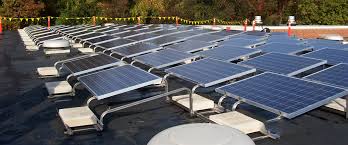The New Jersey Board of Public Utilities approved rules for a community solar pilot, allowing residents to participate in a solar project that is not located on their property, according to a Jan. 17 news release. The agency said that expanding solar access is key to achieve Democratic Governor Phil Murphy’s stated goal of 100 percent clean energy by 2050. The three-year pilot is expected to provide the market information and implementation data required to develop a permanent program.
The program’s annual capacity is limited to 75 megawatts for the first year, and at least 75 megawatts for the remaining period. The agency will allot 40 percent of the program capacity for low- and moderate-income projects. Customers of an electric utility can enroll for a monthly subscription or purchase ownership share in the program, receiving a credit on their utility bills.
New Jersey completed 100,000 installations by the end of 2018, a landmark in the state’s thriving solar industry which has benefitted from net metering, a renewable portfolio standard, and a solar renewable energy credit, or SREC, market.
The agency is crafting a proposal to phase out the current SREC program following legislation enacted in May 2018, which closes the program when 5.1 percent of electricity sold in the state comes from distributed solar, and transition to a new system.






